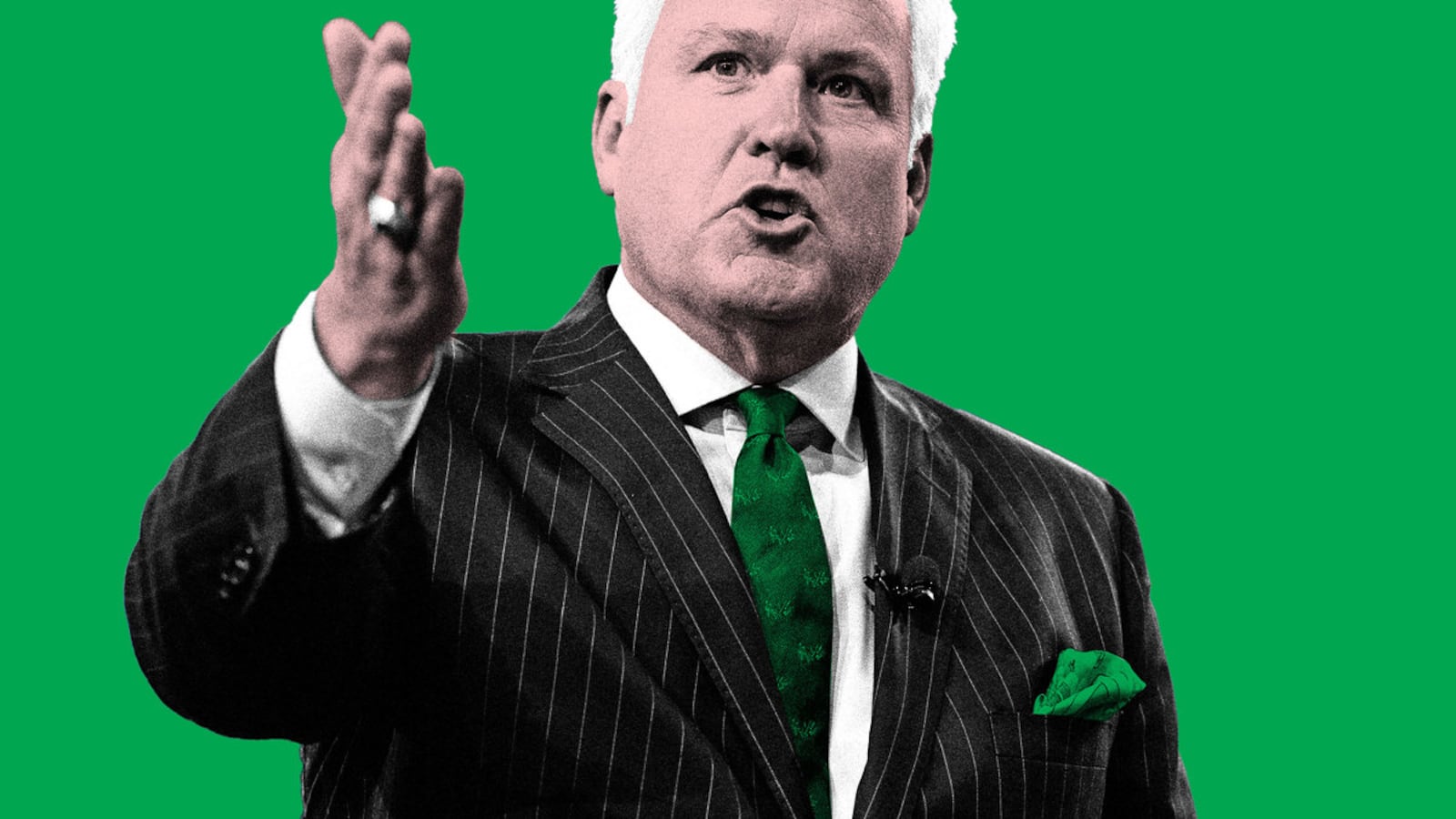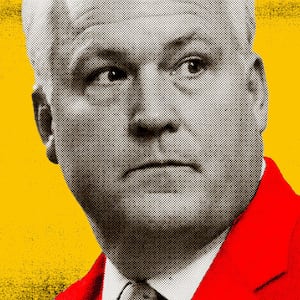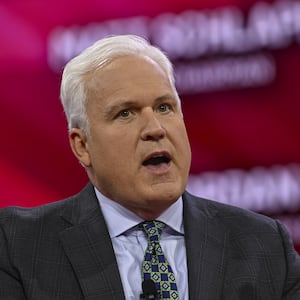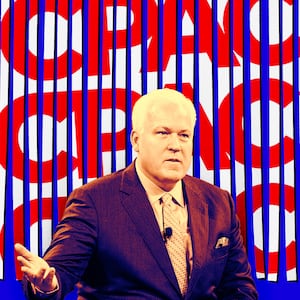When conservative icon Matt Schlapp announced Tuesday that the sexual battery and defamation lawsuit against him had been dropped, he and his allies were quick to note that the ordeal ended without him or the American Conservative Union—the right-wing organization he runs—paying his accuser a single dollar.
But what Schlapp didn’t disclose was that the Republican operative who sued him was, in fact, paid to drop the lawsuit, according to two people with knowledge of the payout. It was just that the money came from ACU’s insurance company, these two people told The Daily Beast.
(Minutes before this article published, CNN ran a story also revealing that the lawsuit was dropped only after Schlapp’s accuser was paid $480,000 from ACU’s insurer—an amount one of the sources confirmed to The Daily Beast.)
While Schlapp’s financial victory lap on a technicality apparently drew the attention of his accuser, it wasn’t the only thing that may have been misleading.
Schlapp’s accuser, former Herschel Walker campaign staffer Carlton Huffman, has also taken issue with the content of a conciliatory statement that a Schlapp spokesperson provided to media outlets in Huffman’s name, these sources said. The verbiage in that statement was not what Huffman had agreed to as part of the settlement, they said.
Hours after the news broke on Tuesday, these sources said, Huffman’s counsel notified Schlapp’s legal team that some of Schlapp’s personal statements and social media posts celebrating the lawsuit’s resolution appeared to be in breach of the agreement’s non-disparagement clause. Those posts have since been taken down, including one where Schlapp, citing a Washington Examiner report on his personal Twitter account, wrote that he had been “cleared” of wrongdoing and that Huffman had “apologized.”
The new allegations suggest that the legal battle—an increasingly contentious dispute that played out under intense media scrutiny for more than a year—might be heating back up almost as soon as it ended.
Huffman filed the lawsuit last January, about 10 days after he first came forward anonymously in The Daily Beast, alleging that Schlapp had “pummeled” his crotch while he chauffeured the conservative influencer to Schlapp’s hotel after a boozy night in Atlanta.
Huffman’s suit also targeted Schlapp’s wife, conservative commentator Mercedes Schlapp, whom Huffman accused of defaming him in a smear campaign after he went public. In December, Huffman added the ACU itself as a defendant, contending that the organization—which hosts the influential CPAC annual gatherings—was liable for negligence after the revelation of two prior accusations of sexual misconduct against Schlapp. A related defamation suit that Huffman had filed in federal court against Schlapp associate Caroline Wren was also withdrawn this week, court records show.
The Schlapps, through various attorneys and surrogates, have denied the allegations, blaming the firestorm on media outlets and a shadowy cabal of Democratic operatives bent on destroying conservatives. (Huffman is a lifelong Republican.)
When the resolution first became public on Tuesday, Schlapp and his allies spun it as an exoneration. Schlapp himself broke the news in a lengthy statement on social media, attacking “left-wing media” groups and Democrats for “waging a relentless war” through the press and legal channels, saying that the scandal had only made his family stronger.
“From the beginning, we asserted our innocence,” the statement began. “Our family was attacked by a left-wing media that is focused on the destruction of conservatives regardless of the truth and the facts. But we emerge from this ordeal stronger as husband and wife, stronger as parents to our five daughters, stronger as friends to those who stood by us.”
Throughout the afternoon, Schlapp posted articles about the dismissal and statements of support from allies. Huffman’s attorney later flagged the content of some of those posts for Schlapp’s counsel as potentially exceeding the terms of the settlement, according to the two sources. Schlapp has now deleted several of those tweets.
The executive committee of the CPAC board also released a statement on Tuesday, applauding the “favorable conclusion” and endorsing Schlapp’s leadership while chiding news outlets that did not “wait for the facts to come out.”
“The left-wing media did not, of course, wait for the facts to come out and instead launched a character assassination campaign to destroy CPAC, Matt, and his family,” the statement said in part, adding that “CPAC’s financial position is also at a historic level of strength” with an “exceptionally engaged” base of support.
Huffman, however, never recanted his claims—though the media statement that ACU had provided in his name chalked the lawsuit up to a “complete misunderstanding.”
It’s not clear which parts of Huffman’s media statement are in dispute. The statement, which was first reported in Politico, was broken into two parts.
“The claims made in my lawsuits were the result of a complete misunderstanding, and I regret that the lawsuit caused pain to the Schlapp family,” the first paragraph said.
The second paragraph flipped the roles, with the Schlapps acknowledging that their allegedly defamatory claims about Huffman were also a “misunderstanding.”
“The Schlapps have advised that the statements made about me were the result of a misunderstanding, which was regrettable,” the second part said. The statement added, “Neither the Schlapps nor the ACU paid me anything to dismiss my claims against them.”
Politico also reported that Huffman had “confirmed the accuracy of the statement” in a text message conversation.
“Asked about the statement, Huffman said in a text message to POLITICO: ‘We have resolved our differences’ and confirmed the accuracy of the statement,” the article said.
In response to questions, the Politico reporter who broke the story, Daniel Lippman, told The Daily Beast that he had full confidence in his reporting.
“I stand by my reporting and would direct you to the story itself, which outlines my interaction with Huffman,” Lippman said.
But it’s unclear whether Huffman was confirming the accuracy of the content in the full media statement, or potentially referencing the independent statement that he texted to Lippman, acknowledging that the dispute had been resolved.
Neither Huffman nor his attorney, Tim Hyland, would comment for this story, though Hyland reiterated that the parties “have resolved our differences.”
The Daily Beast also emailed a comment request to counsel for Schlapp and ACU, but did not receive a reply.
The claim that neither the Schlapps nor ACU paid Huffman is narrowly accurate, but it’s also misleading, according to two people with knowledge of the settlement. It’s true that Huffman’s payout did not come directly from bank accounts held by the Schlapps or the ACU, the sources said, but it was paid through the ACU’s insurer, which ACU in turns pays to provide liability coverage. (Last spring, Schlapp offered Huffman a settlement in the “low six figures,” The Daily Beast previously reported, and Huffman turned it down.)
ACU officials also last year repeatedly voiced concerns about how Schlapp was managing his legal defense, including about how a potential settlement would be handled. Those concerns, they said, were particularly troubling in light of Schlapp’s opacity about the Huffman case along with the organization’s finances more broadly, which a tight inner circle of leadership appeared to be obscuring.
Former executive vice president and longtime board member Charlie Gerow singled out those concerns in a blistering internal letter he tendered upon his resignation last summer. In the letter, Gerow challenged a decision between Schlapp and ACU general counsel David Safavian to add an “indemnification” clause to Schlapp’s compensation agreement.
“This startled me as I had never seen the agreement and had never been told that an indemnification provision was potentially involved,” Gerow said in his letter, as The Daily Beast reported. The letter also warned, “for those who are encouraging Matt to ‘fight this to the end’ the costs are already staggering.”
“Earlier this year we were advised that the legal strategy of Matt’s counsel would ‘blow this case out of the water’ within 30 days,” Gerow wrote. “That obviously did not happen.”
In a separate resignation letter earlier that year, ACU treasurer Bob Beauprez cautioned that a settlement of more than $2 million, combined with the legal expenses, “would break the organization, not to mention the reputational damage.”
At the time of Gerow’s letter—late August—the tab for Schlapp’s defense had already cleared $1 million, Gerow claimed, noting that the costly discovery phase was only just getting underway. Gerow and Beauprez also both warned that the organization itself appeared to be on unsteady financial ground, citing weak revenue streams, rising expenses, and financial mismanagement, while a tight inner circle of leadership restricted visibility into how the group was handling its funds.
Tax records show that the Huffman scandal also appears to have impacted ACU’s bottom line, The Daily Beast reported earlier this month, driving down CPAC’s attendance and ticket prices, repelling major corporate sponsors, and posing a mounting legal burden.
Those costs quickly multiplied. Four months after Gerow’s resignation, Huffman added ACU as a defendant, with new rounds of subpoenas and depositions continuing for months after that. The case appeared headed for a jury trial this June, until the docket suddenly went quiet last week—including canceled depositions from Fox News host Sean Hannity and a young ACU contractor, The Daily Beast reported.
But at least one of Gerow’s predictions did come true. The Huffman lawsuit, he wrote, would not go to trial.
Instead, Gerow believed the Schlapps would settle, possibly with a price tag “in the millions of dollars”—though he worried how much of those costs would ultimately be covered by ACU’s insurance provider, and how much of the group’s own funds would be risked on Schlapp’s personal behalf.
The ACU’s most recent tax filing, which The Daily Beast previously obtained, covers a period between April 1, 2022, and March 31, 2023, capturing the first two months after Huffman filed his suit. The filing states that the organization had paid $135,384 in insurance costs over the reporting period—more than ACU spent on insurance in the previous three years combined.










